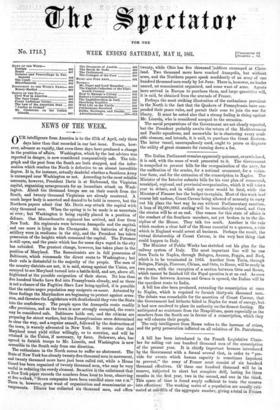The Italian Parliament remains apparently quiescent, overwhelmed, it is said,
with the mass of work presented to it. The Government is compelled to present bills for the reorganization of the navy, for the unification of the armies, for a national armament, for a volun- teer force, and for the extension of the conscription to Naples. The Minister of the Interior submits bills for his vast plan of communal,, municipal, regional, and provincial reorganization, which it will take a year to debate, and in which any error would be fatal, while the Minister of Finance has the budget to explain. Most of this work is of • course left undone, Count Cavour being allowed of necessity to carry out his plans the best way he can without Parliamentary sanction., A loan of 20,000,0001. sterling will be immediately raised, and then the session will be at an end. One reason for this state of affairs. is the conduct of the Southern members, not yet broken in to the dis- cipline of the House. They talk too much. Another is the rule which renders a clear half of the House essential to a quorum, a rule which in England would arrest all business. Perhaps the result, the virtual dictatorship of Count Cavour, is the very best thing that could happen to Italy.
The Minister of Public Works has sketched out his plan for the railway system of Italy. The most important line will be one from Turin to Naples, through Bologna, Ancona, Foggia, and Bari, which is to be terminated in 1863. Another from Turin, through Bologna, Pistoja, Florence, Chinsa, and Orte, to Rome, will be ready in two years, with the exception of a section between Orte and Rome, which cannot be finished till the Papal question is at an end. As soon as the line between Ancona and Genoa is opened, the Italian will be the speediest route to India.
A bill has also been produced, extending the conscription at once to Naples, which is required to furnish thirty-six thousand men. _ The debate was remarkable for the assertion of Count Cavour, that . the Government had hitherto failed in Naples for want of energy, but; it had now resolved to place its authority on the firmest footing. He anticipated no resistance from the Neapolitans, more especially as the members from the South are in favour of a conscription, which they say will educate their people.
The only intelligence from Rome refers to the increase of crime, and the petty persecution inflicted on all relatives of Dr. Pantaleone.






























